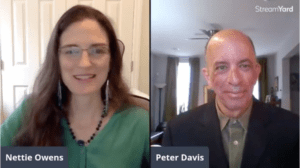When so many businesses and strategies were tossed up in the air in 2020, now may be the perfect time to talk about continuous improvement in order to refocus and evaluate what’s working and what isn’t. Attila Dobai helps growth-focused businesses set a strategy and implement systems and processes to drive growth. He accomplishes this by aligning data with their people, processes, and strategy. Attila is sharing what businesses need to know right now about continuous improvement.
What’s the definition of continuous improvement?
Continuous improvement, as you said, goes by a lot of names. Some people will call it Lean, Six-Sigma, some PDCA, PDSA – and really, these are all about the scientific method being applied to business. So, it’s all about measuring, testing, and improving – from any type of baseline – from where we’re at today to where we want to be – and doing that in a continuous iterative type of way.
The good news is that you get some of those breakthroughs along the way because you’re trying so many things in a repetitive fashion. Rather than aiming for the perfect major breakthrough and having it be all or none, the continuous improvement methodology definitely gives a little more opportunity to get those breakthroughs.
Continuous improvement is a scientific method applied to business. It’s a breakthrough after looking at data – and not just an instant change – but how we can do things over time that are going to impact the goals that we have set. Have you started to use your data to do this kind of evaluation?
How does continuous improvement help service-based businesses?
It can be a little more difficult with the tools and methodologies. When you look at Lean, it was developed by Toyota. When you look at Six Sigma, it was developed out of Motorola’s Baldrige application. All of these tools were developed for manufacturing. They were developed to improve machine and human interactions – think of them as assembly line processes. And that tends to be very different from the reality that you face in a service-based business.
You very rarely come across normal distributions when you have human decision making driving the process all the way along. That’s the bad news side of it. The bad news side of it is that it tends to be very difficult to take one of those canned off the shelf solutions, like the Toyota way, or Six Sigma, or even Lean Six Sigma and apply them directly to a service-based business because it’s just a very different environment. The analytic tools don’t work as well.
The good news is with modern data science, when we combine data science with continuous improvement methodologies, those can be highly impactful for a service-based business. And I know data science can scare people – just the terms data science. People think of somebody with glasses like mine, sitting in a dark corner and crunching the data.
In reality, it doesn’t have to be like that. Data science can be as simple as,”How do we predict an outcome? And how do we prescribe actions to affect that outcome?” Now, that could be something as simple as a linear regression. It can be like a decision tree. You don’t need to approach your first data science projects by writing Python or coding in R. You can literally go through and create a decision tree, a very simple decision tree. And it can help you understand what the most important pieces of your processes are.
Using data science to drive continuous improvement doesn’t have to be scary – and it can be extremely helpful for service-based businesses – especially when understanding processes.
Even when I work with large businesses, I find that the “white box models” tend to be better in the early data science maturity of the organization. Some of these models can be very confusing to try to explain to people. So, when we start with things like decision trees or linear regression – things that are much easier to understand with our human minds – those things tend to be much better received. And they tend to be implemented better within an organization.
So, it doesn’t have to be super scary. Even small businesses can apply these tools themselves and get real value out of them.
What stage should a business be in to benefit from continuous improvement?
I tend to guide people towards the Baldrige methodology, which is from the Department of Commerce in the United States. There are similar programs all over the world. These programs tend to push people towards a learning environment. And when you push towards learning in an organization, you’ll discover that you’ll start collecting data so that you can learn from whatever activities you perform.
I’ve seen the Baldrige framework applied from fortune one businesses all the way down to solopreneurs. There’s no size business that can’t benefit from that. And the good news, again, is it forces you down the road of becoming a learning organization.
The more information that you have, the better decisions you can make. With information, you can make educated decisions versus just seeing what’s immediately in front of you. Data helps you see the connection between the action and the result.
I often say that the best insights come from when data and intuition clash. When I put a set of data in front of an executive, and it clashes with their intuition, there are always great learning opportunities for the executive and for me as a data scientist. For me, it’s about adjusting my model based off what I learned from intuition. For the executive, it’s about honing their intuition so that it becomes more informative for them as a leader in the organization. I tend to think of executive minds as being these great learning algorithms – and I love that.
3 Action Steps
- Decide which continuous improvement methodology is right for your business.
- Analyze the data to help drive your decisions.
- Continue to analyze your data on a regular basis so that you are no longer making decisions based on intuition.
Connect with Attila Dobai at https://www.linkedin.com/in/attiladobai/














No comments yet.